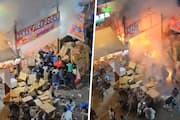PoK witnesses clashes amidst total strike against police crackdown, dramatic videos go viral (WATCH)
A widespread strike paralyzed businesses and daily activities in Muzaffarabad, the capital of Pakistan-occupied Kashmir, as reported by local media on Saturday.
 )
A widespread strike paralyzed businesses and daily activities in Muzaffarabad, the capital of Pakistan-occupied Kashmir, as reported by local media on Saturday. The protest, organized by the Jammu Kashmir Joint Awami Action Committee (JKJAAC), was in response to a police crackdown, resulting in clashes between security forces and demonstrators.
The strike, marked by closed businesses and halted transportation, was accompanied by police deploying tear gas to disperse stone-pelting protesters. The impact extended beyond the streets, reaching homes and mosques. Similar protests erupted in various towns across Pakistan-Occupied Kashmir, including Samahni, Sehansa, Mirpur, Rawalakot, Khuiratta, Tattapani, and Hattian Bala.
The JKJAAC called for the strike following the arrest of several of its leaders and activists in overnight police raids across Muzaffarabad and Mirpur divisions. Additionally, the committee had previously announced plans for a large-scale march towards Muzaffarabad on May 11, indicating a sustained push for their demands.
The Public Action Committee, a prominent rights movement, continues its protest against what it deems "unjust" taxes imposed on electricity bills. Last August, the committee organized a similar shutter-down strike to voice its grievances.
In a recent development, it has been revealed that the Chief Secretary of Pakistan-occupied Kashmir (PoK) reached out to the Secretary of the Interior Division in Islamabad, requesting the deployment of up to six platoons of civil armed forces (CAF) to ensure security during the May 11 strike. This underscores the authorities' anticipation of potential unrest and the need for heightened security measures in response to the strike.
Requesting the additional troops for three months, Chief Secretary Dawood Muhammad Bareach, in his letter of April 22, said: “We are (now) faced with calls for shutter down and wheel-jam strikes from May 11 onwards given by the sub-nationalists and other disgruntled subversive elements. They intend to create a law and order situation by forcibly closing markets and disrupting public service delivery.”
Despite the government's implementation of Section 144 and the declaration of holidays in educational institutions on May 10 and 11 across Pakistan-occupied Kashmir (PoK), thousands of people took to the streets in all districts in anticipation of the strike.
The JKJAAC movement's core demand is that electricity tariffs should be based on the production cost of hydro-power in the state, as reported by Dawn. In December of the previous year, the movement had come to an agreement with an official reconciliation committee, resulting in a government notification issued on February 4.
However, the committee announced a long march for May 11 in April, citing the government's alleged failure to fulfill its written commitments. According to Dawn, all businesses, including banks, remained closed, and there was a notable absence of traffic and vendors on the roads in three districts of Muzaffarabad division, illustrating the widespread impact of the strike.
- Chief Secretary
- JKJAAC
- Pakistan-occupied Kashmir
- Public Action Committee
- Section 144
- Strike
- businesses closed
- civil armed forces
- clashes
- demonstrators
- educational institutions
- electricity bills
- government notification
- holidays
- hydro-power
- interior division
- law and order situation
- long march
- markets
- police crackdown
- protest
- public service delivery
- reconciliation committee
- security measures
- stone-pelting
- sub-nationalists
- tear gas
- traffic halted
- unjust taxes
- vendors absent

 subscribe to Asianet Newsable WhatsApp channel by clicking here.
subscribe to Asianet Newsable WhatsApp channel by clicking here.













